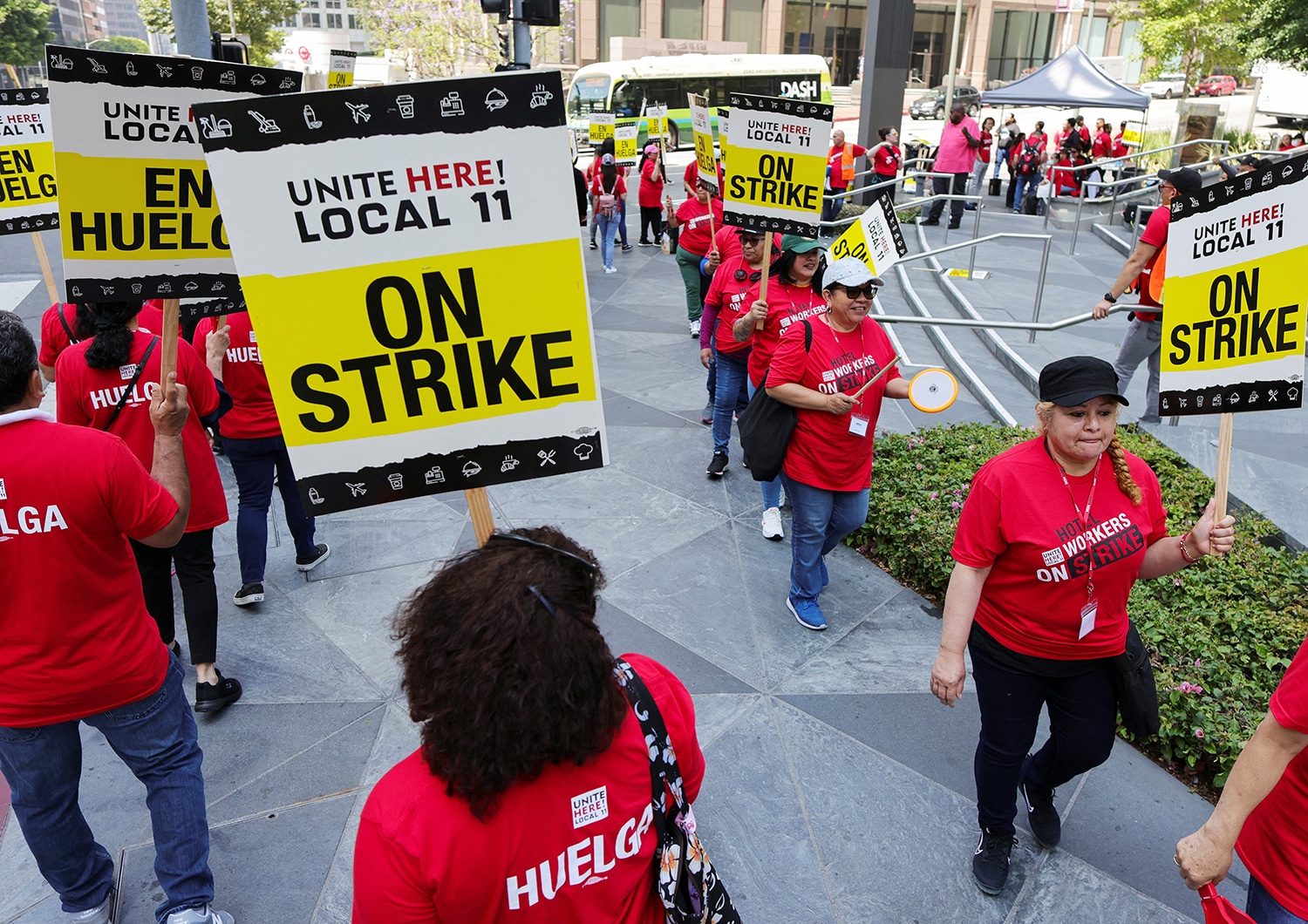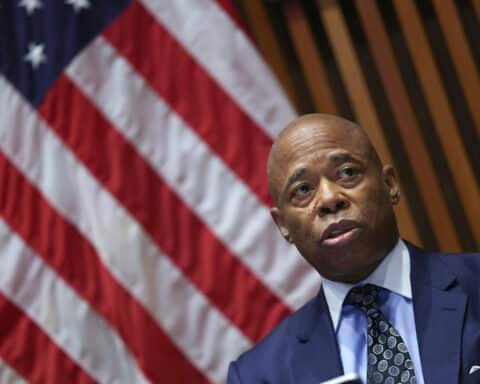(OSV News) — When Unite Here Local 11, the Los Angeles-based branch of the international labor union representing 300,000 U.S. and Canadian workers, announced March 25 a historic labor agreement with 35 Southern California hotels, the victory came with an asterisk attached.
The largest hotel worker strike in modern American history would indeed end at those 35 properties — with others added in the weeks that followed, for a current total of 46 settled contracts. However, employees at several other hotels in the same region — some of which are owned or operated by private equity firms — have yet to settle new contracts. They include Aimbridge properties like the Doubletree Downtown Los Angeles, the LA Grand, and the Hotel Figueroa.
Workers at downtown LA’s Hotel Figueroa have alleged physical attacks and unfair firings in their months of picketing outside the storied property — and were joined April 5 in a show of solidarity by Sen. Bernie Sanders, I-Vt., who advocates union expansion to strengthen the middle class.
Contracts between 61 LA and Orange County hotels and members of Unite Here originally expired the night of June 30, 2023. Since July 1, 2023, more than 10,000 workers at 52 hotels have gone on strike more than 170 times.
Historic labor agreements secured for hotel workers
“The Catholic Labor Network congratulates the hotel workers of Local 11 on their hard-fought wins in their Los Angeles strike,” said CLN executive director Clayton Sinyai. “This largely immigrant workforce showed that when workers stand together in solidarity, they can win a living wage and job security, even in a high-cost area like Southern California. Now it’s time for the remaining hotels which are holding out to offer the same to their workers.”
Unite Here Local 11 represents more than 32,000 hospitality workers in Southern California and Arizona who work in hotels, restaurants, universities, convention centers, and airports.
“We have won an unprecedented agreement in every way, from wages, pension, and healthcare to job security, to fair staffing guarantees,” said Kurt Petersen, co-president of Unite Here Local 11.
Wage increases and demands
The thousands of hotel workers at the hotels that ratified a new contract will see an immediate $5 hourly wage increase and $10 hourly increase over the life of the contract. Housekeepers’ pay will rise to $35 an hour in advance of the 2028 Summer Olympics.
Tourism workers in LA have demanded the city council institute an “Olympic Wage,” raising their minimum wage to $25 an hour immediately with increases of a dollar each year until the games take place. In Long Beach, California, anticipating the FIFA World Cup and the Olympics, a measure passed March 5 to increase the minimum wage for qualifying hotel workers from $17.55 per hour to $23 per hour on July 1, 2024, with annual increases to $29.50 per hour by July 2028.
Housing costs and industry response
Unite Here Local 11 has argued that hotel worker wages have not kept up with “soaring housing costs,” and that the hotel industry — which it said is enjoying “record post-pandemic profits” — needs to provide major wage increases “so that workers can live near where they work.”
The hotel industry, meanwhile, contends that its operating expenses are outpacing growth.
CoStar, a commercial property information and analysis platform, reported in December that U.S. hotel industry operating expenses per available room outpaced revenue growth in 2023, driven by a 12.3% increase in labor expenses. However, it noted that chain hotels absorbed 18% increased labor costs and “still managed to achieve a $10 rate premium in gross operating profit per available room in 2023 compared to the national average.”
A Jan. 9 Stateline report found that hospitality workers — part of “the nation’s lowest-paid industry” — saw pay increase 30% on average over the past four years, “reversing much of the wage inequality that has been growing for decades in the United States.”
Even so, 53% of Unite Here Local 11 workers from an earlier survey said “they either have moved in the past 5 years or will move in the near future because of soaring housing costs.”
The U.S. Department of Housing and Urban Development considers $66,750 per year for a one-person household as the “low income” threshold in LA County. But in order to afford the average $2,781 per month, 788-square-foot LA apartment — while spending no more than the recommended 30% of income — more than $100,000 in income is required.
According to the American Hotel and Lodging Association’s “2024 State of the Industry” report, hotels in 2023 paid 2.1 million employees $118.01 billion in wages, salaries, and other compensation — an average of $56,195 per employee.
Progress and Catholic perspective
Still, Catholic labor experts see progress.
“In 2023, hotel workers went on strike to win improvements that can make their jobs truly family-sustaining. Not all of the hotels have settled yet, and strikes are continuing, but the workers have made tremendous progress,” Joseph McCartin, executive director of the Kalmanovitz Initiative for Labor and the Working Poor at Georgetown University, said. “The overwhelmingly immigrant hotel workers have added their voices to those of auto workers, teamsters, and others who have been making long-needed gains.”
Gerald Beyer, a professor of Christian ethics in the Department of Theology and Religious Studies at Villanova University, whose research has often focused on workers’ rights, agreed.
“The union deserves credit for helping workers who labor under difficult conditions, are often undercompensated, and are treated poorly,” said Beyer. “As St. John Paul II stated (in his encyclical “Laborem Exercens“), unions are a necessary ‘mouthpiece for the struggle for social justice, for the just rights of working people in accordance with their individual professions.'”
Their progress, Beyer suggested, also reflects the requirements of Catholic social teaching.
“The treatment of many hotel workers in California apparently now more closely aligns with the Catholic tradition’s insistence on the dignity and rights of all workers — such as the rights to a just and living wage, safe working conditions, health care, adequate rest, retirement savings and the right to form unions,” Beyer noted.
The right to unionize and seek workplace equity — and to strike, if necessary — is fundamental to Catholic social teaching. Pope Leo XIII, St. John XXIII, St. Paul VI, St. John Paul II, Pope Benedict XVI and Pope Francis have all expounded on unionized labor topics, in both official and unofficial pronouncements.
Support for unions
The U.S. Conference of Catholic Bishops also issued a Labor Day statement in September affirming labor unions’ “essential role” in society and called for them ” to be supported in their work that supports healthy, thriving families.”
In a report delivered Aug. 28, U.S. Treasury Secretary Janet L. Yellen said her department found unionized workers earn up to 15% more pay than nonunion workers, with a higher rate of benefits. She said the Treasury found unions “could contribute to reversing the stark increase in inequality we’ve seen in recent decades, promoting economy-wide growth,” and even increase worker productivity.
“Hotel workers have historically earned well below a living wage, endured widespread workplace health and safety risks, and were not provided with affordable healthcare plans,” Beyer said. “It appears that with the new agreements ratified by unionized hotel workers in Los Angeles, workers are now closer to attaining wages and benefits that more fully respect their dignity and rights.”





